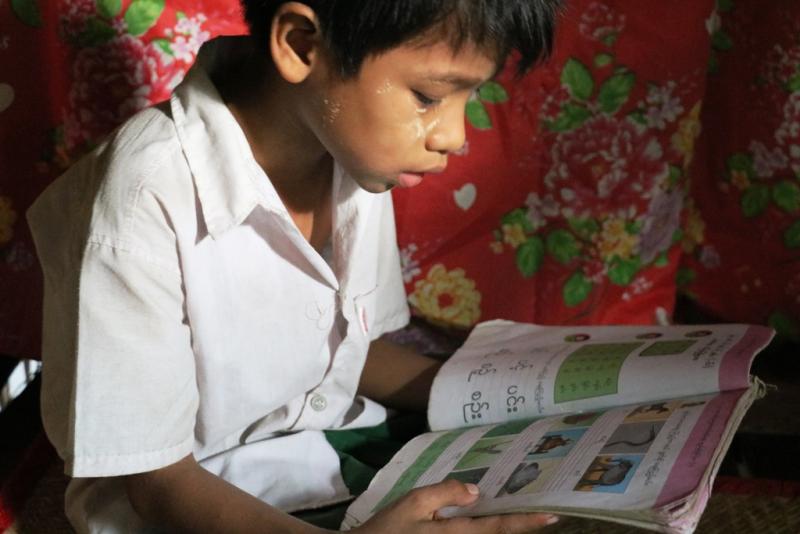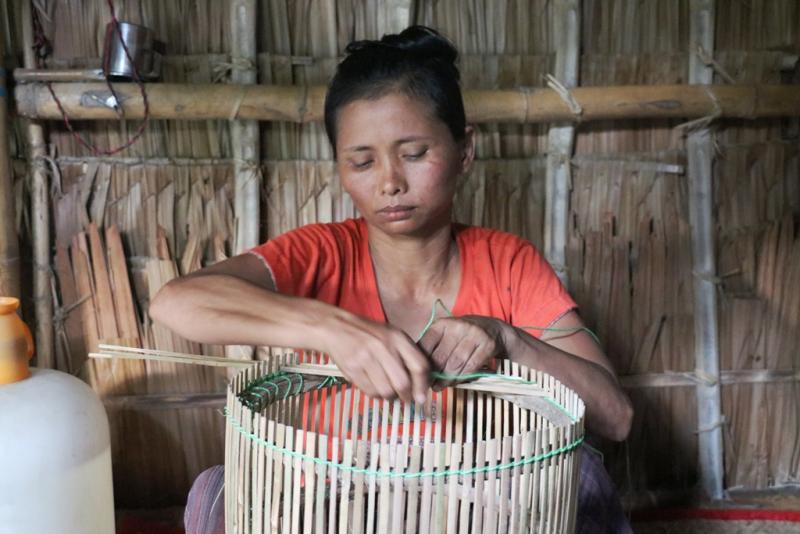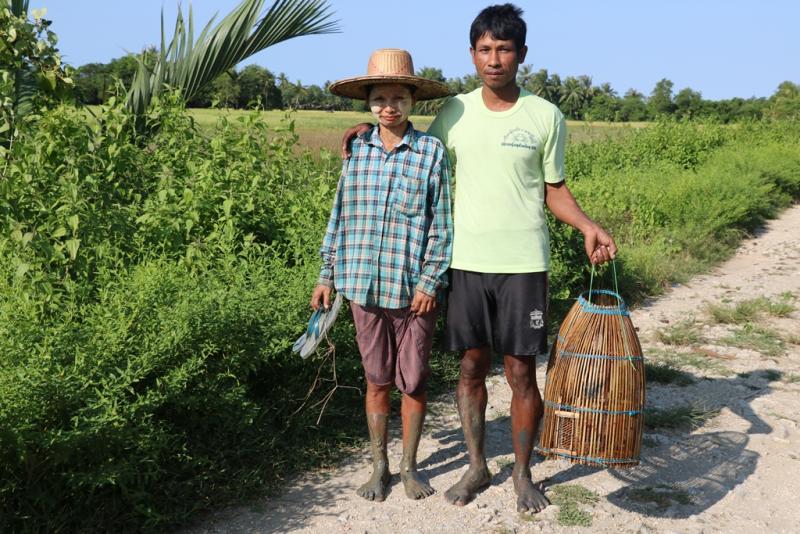
While preparing bamboo sticks for a fish trap, Yin Yin Aye is making plans for what to do next in her day of fishing. The bamboo sticks will be used in a fish trap for Dwarf Catfish. After dinner, she will go out with her husband to check their fish traps are in good spots. She hopes this year’s fish catch will be as good as last year’s. There were days last year when they were able to get more than a 100 Viss of Dwarf Catfish.
Yin Yin Aye is a housewife, a mother of two children, and works together with her husband as a fisher. Untill mid-2017 she and her husband were casual labourers doing seasonal casual work available in the village. Her mother-in-law shared their house and took care of their children while they went out for work. Casual work was not always available and the couple’s income was just enough for a family of four for food. An active woman, Yin Yin, always keeps her eyes and ears open for developments in her village, Kone Gyi. When the village committee started disbursing small loans from a village development fund supported by the LEAD project, funded by LIFT, Yin Yin was interested to do something for her family.
“I discussed with my husband whether we should apply for a loan to start raising pigs so we could earn something extra. He was very supportive but he told me to check and see how other people were managing the loans. Actually, I observed all those things already before I told him”, Yin Yin said with a big smile.
She had never taken loans before, although she had heard of a few microfinance services available nearby. The microfinance payment terms were bi-weekly, which Yin Yin’s family did not find convenient because they were sometimes working in fields far from the village and were not able to visit the microfinance institution on the correct dates.
With a livestock loan of MMK 100,000 from the committee, Yin Yin bought a piglet for MMK 55,000 as a start-up. She and her husband used the rest of the money to fish for Dwarf Catfish. The couple started with around 20 fish traps and went out with a small boat they shared with their neighbour. Apart from the money that had to use for food, Yin Yin saved the rest of their income. The payment term for the livestock loan was to pay monthly interest of MMK 2,000 and a saving amount of MMK 1,000, which she could get back after the loan cycle. After five months, Yin Yin calculated that she and her husband were earning more from fishing than raising pigs, so they sold the pig for MMK 80,000. They were concerned that they would spend the money if they kept it in hand and discussed repaying their loan with the village development fund committee. Although the loan term was a year, the village committee allowed them to pay back the loan immediately. They were then eligible for a second loan after one month. In the meantime Yin Yin connected with her friend who wanted to sell her boat. As soon as she got her second loan, Yin Yin bought that second-hand boat. “With our own boat, we can carry more fish traps so we can earn more”, Yin Yin said. A year later, Yin Yin and her husband built a house of their own and could buy a bigger boat with a motor engine.
“When the LEAD project came to our village, not many people were interested at first as they were observing how that project would work. There were around 70 members when we approached the village development fund group. The members who can commit to working to improve their lives are able to take a loan,” she said.
“Yin Yin and her husband proved their commitment,” said U Kyaw Aye. He is an elderly in Kone Gyi Village and also a supervisor of ‘Sone See Yar’ village development fund group. He is a fishmonger and advises Yin Yin and her husband to not to spend money on unnecessary things and to invest more in their business.
LEAD provides trainings on topics like bookkeeping and organisational development. The village development fund committee’s administrators share knowledge with their members at monthly meetings. Training on livelihood activities also takes place.
“I attended a training for fishers at Pyinsalu and learned about the specific period not to catch fish to prevent the fish from depleting in the future. The period to catch Dwarf Catfish is from Tawthalin to Pyartho (around September to January), ” Yin Yin said.
After the Dwarf Catfish season finishes, Yin Yin buys a variety of vegetables from nearby farms in the village and sells them back at Pyinsualu Town’s market every week. With the increased incomes in family and a momentum in her business, she feels safe for her children’s education for longer term. Having her own farm one day is her ultimate dream.

Yin Yin's son, 9 years old, is studying at home




